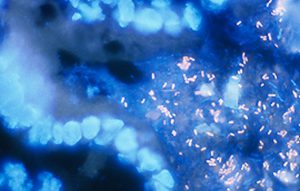
Flora intestinale
A new Stanford-led study in healthy adults found that antibiotics may reduce the effectiveness of the flu vaccine.
The depletion of gut bacteria by antibiotics appears to leave the immune system less able to respond to new challenges, such as exposure to previously unencountered germs or vaccines, said Bali Pulendran, PhD, professor of pathology and of microbiology and immunology at the Stanford University School of Medicine.
“To our knowledge, this is the first demonstration of the effects of broad-spectrum antibiotics on the immune response in humans — in this case, our response to vaccination — directly induced through the disturbance of our gut bacteria,” he said.
Pulendran, who holds the Violetta L. Horton Professorship, is the senior author.
Lead authorship is shared by Stanford postdoctoral scholars Thomas Hagan, PhD, and Mario Cortese, PhD; and Nadine Rouphael, MD, PhD, associate professor of medicine and infectious disease at Emory University.
The idea that the trillions of bacteria inhabiting the human gut play a role in our health is far from new, but it hasn’t been rigorously proved.
Hard data in humans has been sparse, with causal evidence coming mainly from studies in mice.
The new study was inspired by a mouse study that Pulendran and his colleagues conducted in 2011.
Those investigators found that mice raised from birth to have germ-free intestinal tracts failed to mount as strong an immune response to vaccination as their normal counterparts.
So did mice given antibiotics or bioengineered to lack an immune sensor for flagellin, the chief protein constituent of the threadlike flipper that bacteria use for swimming around.
“The question was, does this have any relevance to humans?” Pulendran said.
To try to answer this question, he and his associates conducted a study involving 22 adults ages 18 to 45.
During the 2014-15 flu season, 11 took broad-spectrum antibiotics over five days and got a flu vaccine on day four and
11 others took no antibiotics but got the flu vaccine on day four, as well.
The antibiotics lowered the gut-bacterial population by 10,000-fold.
The resulting loss of overall diversity was detectable for up to one year after the antibiotics were taken.
Still, 30 days after vaccination, vaccine-induced increases in antibodies capable of preventing influenza infection were comparable among the two groups.
But the participants in this experiment tended to have pretty high levels of those antibodies to begin with, suggesting they’d already had some exposure to the flu strains represented in the current or prior seasons’ vaccines.
To see if low counts of gut bacteria might pose a greater obstacle to the immune system’s ability to respond to previously unseen elements in a vaccine — such as new viral strains represented in the seasonal flu vaccine — than to those the immune system remembered seeing before, Pulendran’s team recruited another 11 similarly aged participants for the 2015-16 season.
But this time, they selected only individuals whose low level of flu antibodies indicated low prior exposure to the virus or to the vaccine itself.
None of the new recruits had gotten flu vaccinations for at least the past three years.
Five individuals got broad-spectrum antibiotics, as in the previous year.
The other six served as controls.
All 11 got vaccinated.
Again, gut-bacteria counts in individuals who received antibiotics plummeted, as in the previous year.
But this time there was a big change in levels of an antibody subtype most responsible for countering the influenza virus: This subtype failed to burgeon in the blood in response to the vaccine.
Notably, the deficit in this antibody subtype correlated strongly with post-antibiotics decreases in total gut bacteria as well as in flagellin, the bacterial protein, in volunteers’ stool samples — a proxy for microbial abundance in the gut.
The recipients of the antibiotics exhibited many signs of systemic inflammation — the same immunological signature Pulendran has observed among people ages 65 and older after an influenza vaccination in a prior study.
The degree to which antibiotics recipients’ immune systems exhibited this bodywide, aging-associated systemic inflammation mirrored the extent of depletion, in participants’ blood, of a series of metabolites whose generation requires gut-bacterial assistance.
These metabolites, called secondary bile acids, are known to dial down inflammatory processes in the immune system.
Intestinal bacteria fashion them from primary bile acids initially produced in the liver.
Levels of one important secondary bile acid, lithocholic acid, plunged by 1,000-fold in the bloodstreams of antibiotic recipients, and was inversely correlated with the amount of inflammation.
“The study indicates that when it comes to responding to vaccination against a previously encountered infectious pathogen, our immune systems are remarkably resilient even in the face of the most severe depletion of our intestinal bacteria,” Pulendran said.
“But they seem to lose this resilience when confronted with a vaccine containing new pathogenic elements of which they have little or no prior memory.”
Pulendran offered some advice. “Get your annual flu shot,” he said.
“The greater your inventory of immune memory to influenza strains bearing any resemblance to the one that’s coming over the hill, the more likely you’ll be able to deal with it, even if your gut microbes are in short supply.”
Pulendran is a member of the Stanford Institute for Immunity, Transplantation and Infection and a faculty fellow of Stanford ChEM-H.
Other investigators at Emory University, as well as researchers at the Ragon Institute, the University of Chicago, Georgia State University and the Food and Drug Administration contributed to the work.
For more information
Cell
Antibiotics-Driven Gut Microbiome Perturbation Alters Immunity to Vaccines in Humans
Link…
Stanford Medicine
Link…
Emoty University
Link…
Ragon Institute
Link…
University of Chicago
Link…
Georgia State University
Link…
U.S. Food and Drug Administration – FDA
Link…
MDN
This post is also available in:
 Italian
Italian


